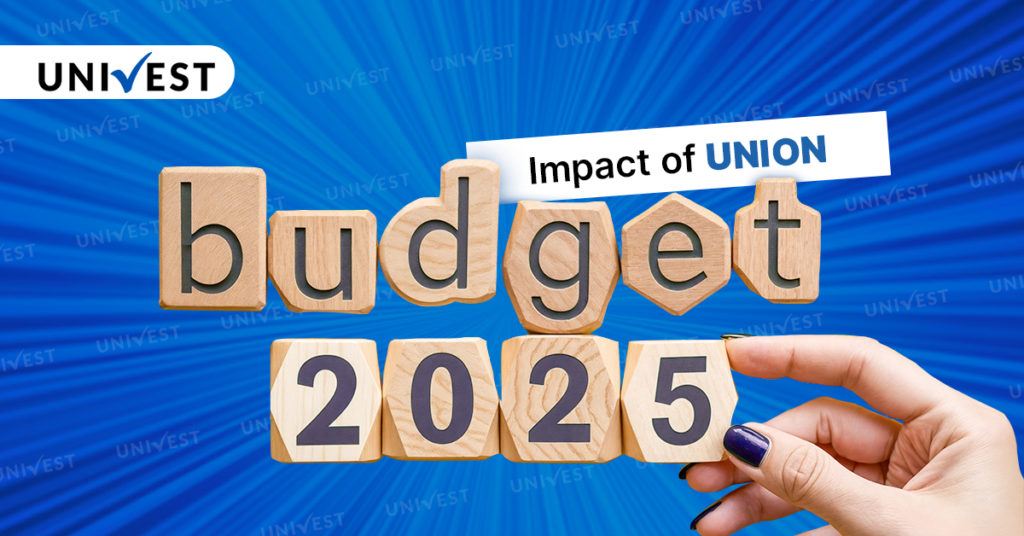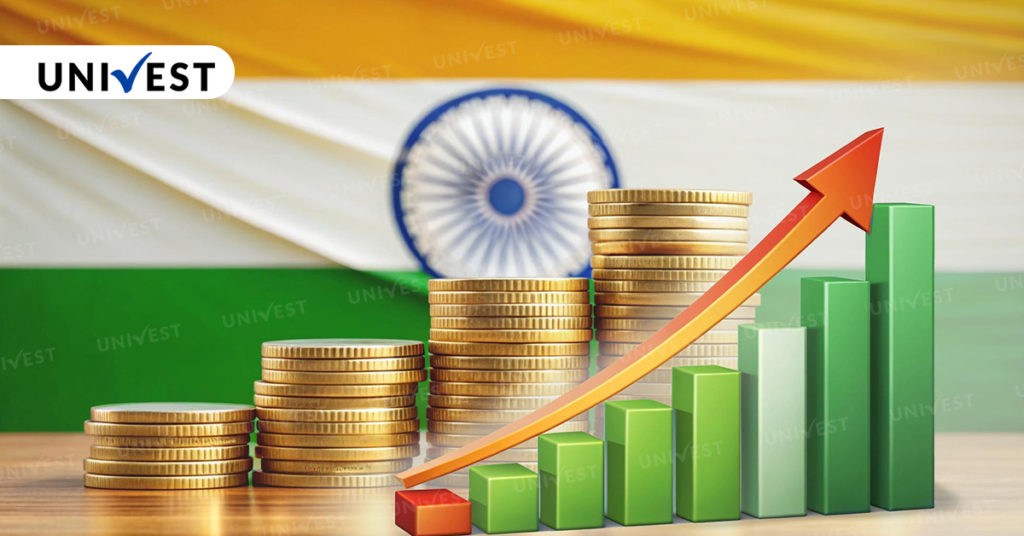
Union Budget 2025 Highlights & Economic Impacts
Posted by : sachet | Thu Jul 24 2025

The Union Budget 2025 will transform India to address the economic challenges and is an opportunity for growth. Numerous amendments were announced in the prior budget concerning tax deduction at source (TDS) or capital gains tax. However, budget 2025 is expected to bring something new to encourage further lower tax litigations.
This budget is expected to shape India’s future for the coming decades. This article will explore the key highlights of the Indian Budget 2025, expectations, highlights, and sectorial impact. We will also explore what experts are predicting about the budget and its effect on the long-term growth trajectory of India.
What is Union Budget 2025?
Union Budget 2025 is the summarised record of government spending during the financial year. It includes detailed government plans to uncover growth opportunities across diverse sectors by accumulating funds. Budget 2025 is to be presented on 1st February 2025 by the Finance Minister, Smt. Nirmala Sitharaman.
The primary aim of the Indian Budget 2025 is to provide opportunities for more than 41 million young people over the next few decades. On the other hand, the government has also revealed some secondary objectives behind the budget. These include.
- Employment Generation
- Allocation of Funds
- Bringing Sustainability
- Modernising India
- Encourage Economic Growth
- Addressing the Inflation Concerns
The finance minister will likely announce GST amendments 2025 per the GST council’s recommendations. But there is much more to be revealed on 1st February 2025.
Union Budget 2025 Highlights
Here are the key proposals in budget 2025 anticipated in the Union Budget 2025.
1. GST Amendments 2025
Goods and Services Tax (GST) was rolled out, effective on 1st July 2017. Since then, multiple modifications have been made. The Finance Minister, Smt. Nirmala Sitharaman will likely include GST amendments 2025, followed by the 54th and 55th GST Council meetings in the Budget 2025.
2.Viksit Bharat Vision
The government is to provide a strategic plan for Viksit Bharat’s vision in the Indian Budget 2025. The NDA government expressed their focus on introducing measures under this vision to benefit the common man by creating infrastructure and employment opportunities.
3. Healthcare Deductions Under Section 80D
Rising medical expenses are now a concern of the government of India. Taxpayers expect an increase in deductions towards health insurance, ranging from Rs 25,000 to Rs 1,00,000. An increase in healthcare deduction under Section 80D of the Income Tax Act would be one of the key proposals in budget 2025.
4. MSMEs & Start-Ups
The government is to announce a Credit Guarantee Scheme for MSMEs in the manufacturing sector to help them during the stress period. Moreover, in the Mudra Loans category, the limit will be enhanced to Rs 20 lakh from the current limit of Rs 10 lakh under the “Tarun” category. This might influence the manufacturing and services sector in India.
5. Housing & Urban Sector
The Union Budget 2025 would introduce PM Awas Yojana Urban 2.0 to help 1 crore poor or middle-class people with an investment of Rs 10 lakh crore. On the other hand, the budget will also promote the water supply and sewage treatment projects for 100 big cities.
6. Employment Linked Incentive
Pradhan Mantri Shri Narendra Modi’s scheme for freshers to give them one-month wage in all formal sectors in 3 instalments (up to Rs 15,000) will be introduced in the Indian Budget 2025. This amount will given to around 210 lakh young people. Furthermore, the government is to reimburse EPFO contributions of employers up to Rs 3000 per month for 2 years for new entrants in the jobs.
7. Custom Duty Changes
Budget 2025 analysis indicates that the government will reduce custom duty on gold and silver to 6% and platinum to 6.4%. Moreover, 25 critical minerals are targeted to fully exempt the custom duties. The government is also looking to reduce Basic Custom Duty (BCD) to 15% on mobile PCBA, phones, and chargers.
8. Infrastructure Development
The government has made a provision of Rs 11,11,111 crore (almost 3.4% of GDP) for infrastructure development activities. Phase 4 of PMGSY is to be launched to offer connectivity to 25,000 rural habitations.
9. Securities Transaction Tax (STT)
STT change came into effect on 1st October 2024. It aims to provide tax exemptions on long-term capital gains (LTCG) and concessional rates for short-term capital gains (STCG). The Finance Minister is all set to announce competitive tax rates in the Union Budget 2025 as the STT abolition is warranted.
10. Women Workforce
In the coming Budget 2025, women’s participation in the workforce will be influenced by setting up working woman hostels across different states. It will encourage women empowerment and also influence employment generation in the country.
Union Budget 2025 Expectations
As of now, we’ve explored the key proposals in budget 2025 highly anticipated from the upcoming budget announcement on 1st February 2025. Now is the right time to explore some of the Union Budget 2025 expectations that might derive economic growth trajectory in India. Keep scrolling to explore.
- Foreign Bank Tax Rate Reduction
In the prior budget 2024, tax rates for foreign companies were reduced by the government of India. However, foreign banks are also acclaimed for having higher tax burdens than Indian banks. This indicates that further reduction in tax rates for foreign banks is required, and we can expect it from the Indian Budget for 2025.
- Tax Refunds
It can be expected that the government can mandate the timely initiate of tax refunds to influence the confidence of investors. It may encourage taxpayers to align themselves with the exact tax amount as per the provisions of the Income Tax Act.
- GIFT-IFSC Incentives
Tax holidays for insurance companies could be extended to 15 to 20 years and for green finance, tax relief would be announced. It might represent India as the global financial hub.
Sector-Wise Impact of Union Budget 2025

Budget 2025 will definitely impact different sectors in India. Here is a brief overview of the sector-wise impact of Union Budget 2025.
- A reduction in GST on hybrid vehicles from 28% to a reduced percentage will make hybrid cars affordable. It will leverage sustainable mobility in the automobile sector.
- ITC rules under GST will be amended to reduce tax burdens on property sales or purchases. This would make products and services of the real estate sector more affordable.
- Extension of deductions under Section 80D for healthcare insurance might leverage growth in the healthcare industry and will also make healthcare services budget-friendly.
- People demand a reduction in GST on educational services and implementation of New Education Policy (NEP) reforms. It will make education accessible in India.
- Budget 2025 might increase the financial initiative under PM Kisan Samman Nidhi Scheme from Rs 6,000 to Rs 12,000. It will foster a growth trajectory in India’s agriculture sector.
Impact of Union Budget 2025 on Middle-Class
Middle-class people often become the country’s backbone, contributing to economic growth. In the Indian Budget 2025, the middle class may see tax relief, increased access to affordable healthcare services, and other social surety benefits. The highlights, as mentioned earlier, and Union Budget 2025 predictions might reduce the financial burden on this group.
Moreover, this budget is expected to address inflation challenges that might help such people access products and services at the lowest possible prices. In contrast, the government is also focused on encouraging women’s workforce participation, which would help middle-class women meet their financial needs.
Economic Reforms in Budget 2025

The Finance Minister, Smt. Nirmala Sitharaman is set to announce numerous bold reforms in the Union Budget 2025. It includes schemes to provide affordable housing, strategies to reduce fiscal deficit, and initiatives to foster sustainable growth.
For example, Phase IV of PMGSY is set to be launched in the budget to provide connectivity to around 25,000 rural habitations. And again, the amount under the PM Kisan Samman Nidhi Scheme is to be increased from Rs 6,000 to 12,000.
Many other economic reforms are decided to be announced on 1st February 2025. Stay informed with the Univest to know about the upcoming budget trends.
Government Spendings in Union Budget 2025
The government of India expressed a keen interest in increasing funds for diverse sectors like healthcare, education, defence, agriculture, IT, and energy. This increase will leverage the development of the economy and may also foster sustainable growth. Here is an idea of the expenses the government might announce in the Indian Budget 2025 on 1st February.
| Sectors | Amount (in Cr.) |
| Energy Sector | 68,000 |
| Education Sector | 1,25,000 |
| Defence Sector | 4,54,000 |
| Agriculture Sector | 1.51,000 |
| Information Technology Sector | 1,16,000 |
| Healthcare Sector | 89,000 |
Note: The above table shows an idea of the government spending and may be subject to change as per the government announcement.
Will Union Budget 2025 Generate Employability?
Employment and skilling could be the two different priorities of the Indian government in the Indian Budget 2025. Here are some reforms that might contribute to employment generation in India.
- Employment Linked Incentive
Pradhan Mantri Employment Linked Incentive scheme will likely be introduced in the coming Budget 2025 to offer financial benefits to employers who hire fresh graduates. It will generate millions of jobs across the country, typically for freshers.
- Infrastructure Projects
The Finance Minister, Smt. Nirmala Sitharaman will introduce Phase IV of Pradhan Mantri Gram Sadak Yojana (PMGSY) to create construction jobs in rural as well as urban areas.
- Women Workforce Participation
The government of India is set to launch an initiative of making women hostels across different states to encourage women participation in employment. It would be an opportunity for employees and employers in the formal sector.
- Skill Development Programs
In the Union Budget 2025, the government will fund a skill development program to upskill the youth of the country. It will benefit the young population to grab job opportunities in the fast-paced competitive environment.
- Support For MSMEs
Launch of Credit Guarantee Scheme for MSMEs helps start-ups and small businesses during the struggle time. It will encourage small businesses hire new talent from the market and may also leverage employment generation in India.
Union Budget 2025 Predictions By Experts

As Budget 2025 is yet to be presented officially. So, most experts kept making Union Budget 2025 predictions to make a final conclusion. For example, Kumarmangalam Vijay, a Partner at JSA Advocates & Solicitors, says that the new tax regime introduced in Budget 2020 has already simplified the tax administration but has increased the compliance burden on taxpayers. Thus, the government can merge the old tax regime with the new one to balance the simplification of the tax system with low compliance and tax burden.
Then again, Subhash Chand Aggarwal, the Chairman and MD of SMC Global Securities Ltd., said that the old tax regime was a burden for taxpayers but provided more exemptions and deductions benefits. And the new tax regime is just the opposite of it. Hence, the merger of these tax regimes might help the government to simplify the tax structure and provide benefits to the citizens.
Also Read: Budget 2025 Expectations Updates: Will Government Merge Old and New Tax Regimes?
Final Thought
Union Budget 2025 is supposed to be presented on 1st February 2025 by the Finance Minister, Nirmala Sitharaman. Key proposals in Budget 2025 include GST amendments, custom duty exemption, reduction in taxes, PMGSY Phase IV, and 80D deductions. Actual reforms are yet to be announced on budget day, but some experts are anticipating the merger of old and new tax regimes. They claimed that this merger would play a pivotal role in simplifying the tax system along with increased exemptions or deductions for the taxpayers.
The government should increase its spending across different sectors to leverage economic growth. Moreover, financial reforms might help middle-class families and individuals meet their financial needs. Indian Budget 2025 will likely make India a financial hub in the world.
FAQs on Budget 2025
1. What is Union Budget 2025?
Ans. Union Budget 2025 is the summary of government expenditures across diverse sectors during the financial year 2025-2026. The Finance Minister, Smt. Nirmala Sitharaman will present the budget on 1st February to announce the allocation of funds across different sectors.
2. When will Union Budget 2025 be presented?
Ans. Union Budget 2025 is set to be presented on 1st February 2025. The Finance Minister, Smt. Nirmala Sitharaman will announce the budget on this prescribed date and will bring a drasting reform in India’s growth trajectory.
3. Which sector will benefit most from Budget 2025?
Ans. The Budget 2025 is an opportunity for different sectors to influence their growth. Major factors that might have a huge influence on the budget include agriculture, manufacturing, services, defence, and more. As of now, it has been analysed that the government will allocate around Rs 11,11,111 crore to the infrastructure sector.
4. How will Union Budget 2025 impact the middle class?
Ans. Budget 2025 will bring several reforms and tax cuts to relieve middle-class families. The budget may address the inflation challenges for these families that will make healthcare services more affordable, reduce tax liabilities, and provide social surety benefits. In India, middle-class families deal with high financial burdens, which is the focus of the government for this Union Budget 2025.
5. What is Viksit Bharat Vision in Budget 2025?
Ans. In the Union Budget 2025, the Indian government will highlight and make changes to the Viksit Bharat Vision. This vision aims to make India sustainable and modern. It will also influence job creation, infrastructure development, and equitable growth in the country.
6. Will Budget 2025 generate employment?
Ans. Yes, the Budget 2025 will generate more employment in India. We are anticipating that the government will introduce significant reforms in this budget, like enhancing women workforce participation, Viksit Bharat vision, Phase IV of PMGSY, and more.
Read Our Articles on the Best Stocks
Tech Stocks in India to Invest in 2025 | Tech Sector Stocks
Best Battery Stocks in India to Invest in 2025 | Battery Sector Stocks
Best Shipping Stocks in India to Invest in 2025 | Shipping Sector Stocks
Paint Stocks in India to Invest in 2025 | Paint Sector Stocks
Paper Stocks in India to Invest in 2025 | Paper Sector Stocks
Best Semiconductor Stocks in India 2025
Best Large Cap Stocks in India 2025
Best Cement Stocks To Invest in India
Also Explore
| Best Stocks | Multibagger Stocks | Penny Stocks | Fundamentally Strong Stocks | Sector-Wise Stocks | PSU /Government Stocks |
| For the Next 10 Years | For the Next 5 Years | Solar Penny Stocks | On BSE | Solar Energy Sector | PSU Stocks List |
| Long Term | Below 100 Rs | Top 5 Penny Stocks | For Long-Term | Hospitality Sector | PSU Stocks in 2025 |
| Best Bike Stocks | For 2025 | Best Penny Stocks in India | Penny Shares | Hotel Sector | Government Stocks in 2024 |
| Best Liquor Stocks | High-Growth Stocks | For 2025 | Agriculture Sector | Government Stocks List | |
| Best Railway Stocks | Under 500 | Penny Stocks | Pharma Sector | Government Stocks in 2025 | |
| Best Auto Stocks | For 2026 | Oil and Gas Sector |
Univest Screeners
Explore Webstories on Univest
1. Best Time To Buy Dividend Stocks
2. How RBI Policies Affect Dividend Stocks
3. Can Dividend Stocks Beat Inflation
4. What Is The Dividend Aristocrat List
Related Posts
Why is JP Power Share Price Falling?
Why is the MRF Share Price Falling?
Best SIP Plans for 3 Years in 2026: Build Wealth with Stability
Acetech E-commerce IPO Review 2026: GMP Flat, Key Investor Insights
PNGS Reva Diamond Jewellery IPO Day 3: Subscription at 0.99x, GMP Rises 0.26% | Live Updates

